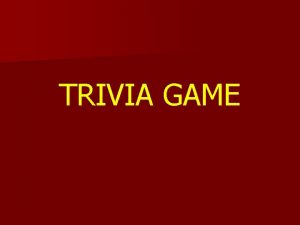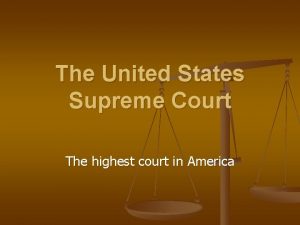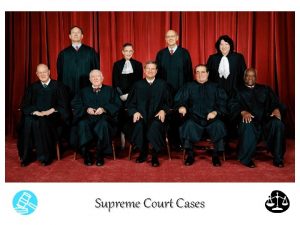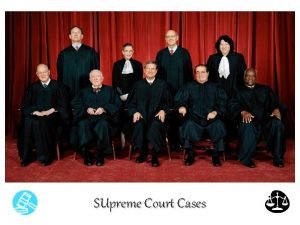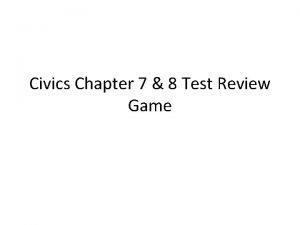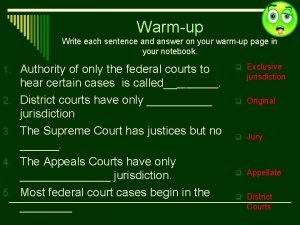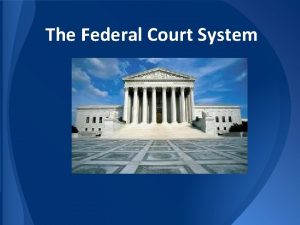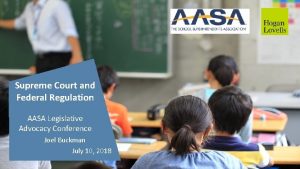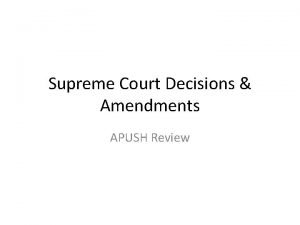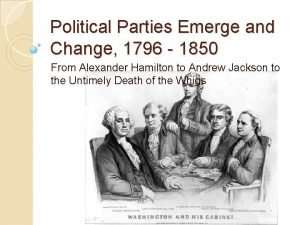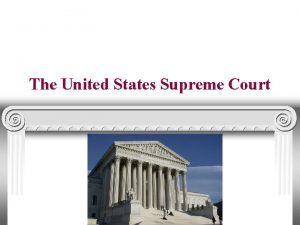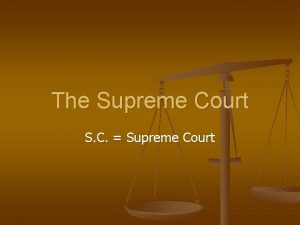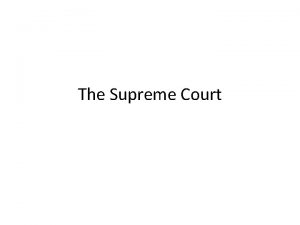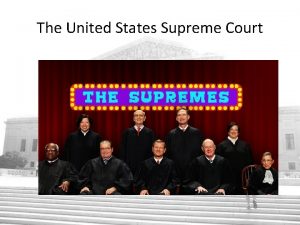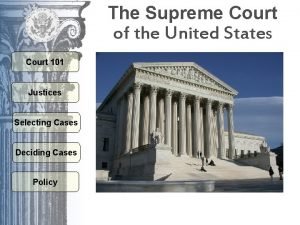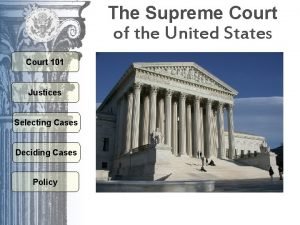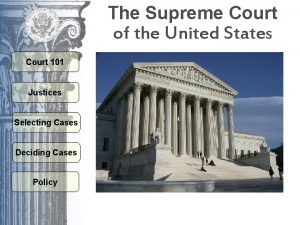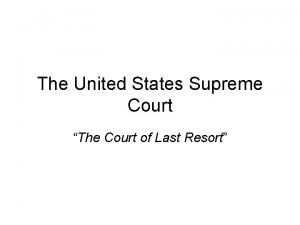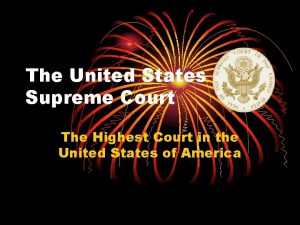The United States Supreme Court The Supreme Court












- Slides: 12

The United States Supreme Court

The Supreme Court Justices • The main job of the nation’s top court is to decide whether laws are allowable under the Constitution. • The Supreme Court has original jurisdiction only in cases involving foreign diplomats or a state. • All other cases come to the Court on appeal.

The Supreme Court Justices • The Court chooses the cases it hears. • In cases the Court refuses to hear, the decision of the lower court stands. • The Court has final authority on cases involving the Constitution, acts of Congress, and treaties. • Eight associate justices and one chief justice make up the Supreme Court.

The Supreme Court Justices • After deciding a case, the justices issue a written explanation, called the Court’s opinion. • The president appoints Supreme Court justices, with Senate approval. • The president’s decision may be influenced by the Justice Department, American Bar Association, interest groups, and other Supreme Court justices.

The Supreme Court Justices • Supreme Court justices are always lawyers. • A successful law career, political support, and agreement with the president’s ideas are factors in whom gets appointed.

Powers of the Court • The legislative and executive branches must follow Supreme Court rulings. • Because the Court is removed from politics and the influences of special-interest groups, the parties involved in a case are likely to get a fair hearing. • The Court’s main job is to decide whether laws and government actions are constitutional, or allowed by the Constitution.

Powers of the Court • It does this through judicial review-the power to say whether any law or government action goes against the Constitution. • The Constitution does not give the Supreme Court the power of judicial review. • The Court claimed the power when it decided the case Marbury v. Madison.

Powers of the Court • As President John Adams was leaving office, he signed an order making William Marbury a justice of the peace. • The incoming president, Thomas Jefferson, refused to carry out the order. • Marbury took his case to the Supreme Court.

Powers of the Court • In the Court’s opinion, Chief Justice John Marshall set fourth three principles of judicial review: 1. The Constitution is the supreme law of the land. 2. If a law conflicts with the Constitution, the Constitution rules. 3. The judicial branch has a duty to uphold the Constitution.

Powers of the Court • Thus, it must be able to determine when a law conflicts with the Constitution and nullify that law. • The power of judicial review serves as a check on the actions of the executive and legislative branches. • Congress writes laws in general language. Through its rulings, the Supreme Court interprets the meaning of laws, helping the police and other courts apply them.

Limits on the Courts’ Power • The Court depends on the executive branch and state and local officials to enforce its decisions. Usually they do. • Congress can get around a Court ruling by passing a new law, changing a law ruled unconstitutional, or amending the Constitution.

Limits on the Courts’ Power • The president’s power to appoint justices and Congress’s power to approve appointments and to impeach and remove justices serve to check the power of the Court. • The Court cannot decide that a law is unconstitutional unless a law has been challenged in a lower court and the case comes to it on appeal. The court accepts only cases that involve a federal question. It usually stays out of political questions.
 Is there a basketball court above the supreme court
Is there a basketball court above the supreme court Plessy v ferguson summary
Plessy v ferguson summary Supreme court cases graphic organizer answers
Supreme court cases graphic organizer answers Insular cases apush
Insular cases apush The u.s. supreme court works chiefly as a(n)
The u.s. supreme court works chiefly as a(n) How cases reach the supreme court worksheet answers
How cases reach the supreme court worksheet answers The supreme court
The supreme court Us circuit court map
Us circuit court map Which of these best summarizes the monroe doctrine?
Which of these best summarizes the monroe doctrine? Supreme court does
Supreme court does Apush supreme court cases
Apush supreme court cases Supreme court
Supreme court The supreme court change
The supreme court change
